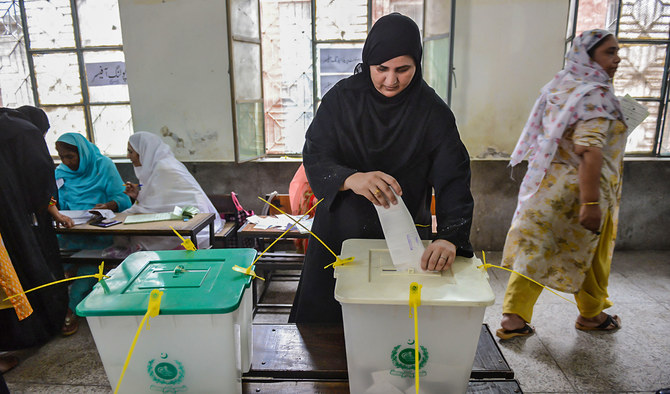ISLAMABAD: Pakistan’s interim information minister Murtaza Solangi stressed the importance of unfettered political participation in the upcoming national elections on Sunday, saying the state media must remain impartial during the political contest.
Solangi’s issued the statement at a time when supporters of former prime minister Imran Khan’s Pakistan Tehreek-e-Insaf (PTI) party have tried to highlight attempts to eliminate their top leader from the political landscape of the country.
Khan has been facing a number of cases since his ouster from power in a parliamentary no-trust vote in April of last year and remains incarcerated in a high-security prison on charges of corruption and violating the Official Secrets Act.
Addressing a ceremony at Radio Pakistan Karachi, Solangi said it was clearly written in the constitution that the country would be run by democratically elected leaders.
“The state media should not support or oppose any political party,” he was quoted as saying by the Associated Press of Pakistan news agency.
He said it was the responsibility of the caretaker government to provide the right environment for transparent polls. He instructed the country’s official media to provide fair coverage to all registered political parties in the country.
It may be recalled that Prime Minister Anwaar-ul-Haq Kakar said in an interview with The Associated Press on Friday it was “absolutely absurd” to say Pakistan’s powerful military would want to manipulate the election results keep ex-PM Khan from winning.
However, he also maintained in the same conversation it was possible to hold fair elections without the former premier and his jailed party leaders since they were involved in violent protests on May 9 and were facing legal action as a consequence.
Pakistan’s interim government advocates inclusive elections, calls for impartial state media coverage
https://arab.news/469be
Pakistan’s interim government advocates inclusive elections, calls for impartial state media coverage

- Murtaza Solangi says it is the responsibility of the caretaker government to create the right environment for transparent polls
- PM Kakar told international media on Friday it was possible to hold fair elections without ex-PM Khan who was facing legal action
Pakistan tightens private Hajj scheme for 2026 after thousands miss pilgrimage

- Saudi Arabia awarded Pakistan ‘Excellence Award’ for overall Hajj 2025 arrangements
- The government says it refunded $12.5 million to pilgrims who went to Hajj last year
ISLAMABAD: Pakistan said on Wednesday it had tightened regulations for private Hajj operators for the 2026 pilgrimage after thousands of pilgrims were unable to travel last year, as the government moved to curb mismanagement and ensure refunds for affected applicants.
Federal Minister for Religious Affairs and Interfaith Harmony Sardar Muhammad Yousuf told the media in Islamabad that the private Hajj quota had been reduced and an investigation carried out on Prime Minister Shehbaz Sharif’s instructions.
The announcement came even as Pakistan received Saudi Arabia’s “Excellence Award” for its overall arrangements during Hajj 2025, while authorities said they had refunded Rs 3.5 billion ($12.5 million) to pilgrims who performed Hajj in 2025.
“Last year, 60,000 pilgrims were unable to perform Hajj under the private Hajj scheme, prompting the Prime Minister to order inquiries,” Yousuf said. “Consequently, the private Hajj quota has been reduced this year.”
He said private operators had been directed to prioritize pilgrims who were left behind last year and had yet to receive refunds, adding that full refunds would also be ensured for pilgrims unable to travel on medical grounds or under the hardship quota.
Yousuf said the government had expanded the “Pak Hajj App” and extended Saudi Arabia’s Makkah Route Initiative to Karachi to reduce travel and immigration difficulties for pilgrims.
He added that new regulations for Umrah and religious travel were being finalized to protect pilgrims from exploitation by private operators and to fully digitize the system.
The minister also said women who were confident of performing Hajj and Umrah without a male guardian could do so, with separate groups now being formed, while certificates would be mandatory for women traveling alone.
Responding to another question, Yousuf said no member of parliament or standing committee was being provided free Hajj or Umrah by the ministry, adding that all officials would bear their own expenses.










